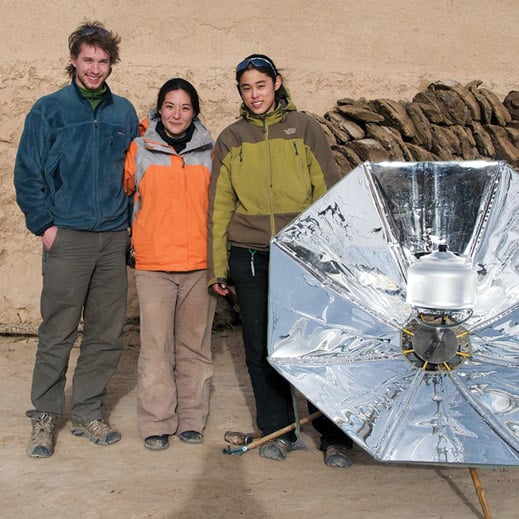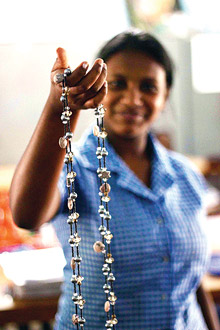As director of the Public Service Center (PSC) for the past 13 years, Sally Susnowitz has heard many ambitious ideas. Students have come to her wanting to change sanitation systems in the slums of the world and revolutionize energy generation in rural China. Her response: why not? It’s her job to focus those passions into feasible plans of action. “Skepticism isn’t warranted; scrutiny is warranted,” she says.

Guidance from Susnowitz and her staff has helped these and many other ideas come to fruition. The student-founded Sanergy provides accessible, clean toilets for the Nairobi slums in the form of low-cost, franchised sanitation centers that also create jobs. One Earth Designs, cofounded by Scot Frank ’08, supplies customizable solar technologies for cooking, heating, and electricity to communities on the Tibetan plateau and elsewhere with its SolSource device. The invention has won numerous awards and saved lives by replacing pollution-causing fuels burned in homes. Frank recalls that Susnowitz was particularly helpful in focusing his solution. “She’d always come up with questions that poked holes in my thesis statement,” he says with a chuckle.
In 2012, the PSC and its eight full-time staff members offered guidance to some 2,500 undergrads and 300 grad students; about 250 students pursued international projects. In the 2011–’12 academic year, more than $325,000 was distributed to students in the form of grants, fellowships, internships, and awards. Support also comes through service work-study programs and the IDEAS Global Challenge, an annual innovation contest that awarded money to both Frank and the Sanergy team to pursue their ideas.
Starting Small and Local
The PSC began 25 years ago when Dean Shirley McBay asked Priscilla Gray, wife of President Paul Gray ’54, SM ’55, ScD ’60, to help harness students’ humanitarian impulses. McBay appointed Virginia Sorenson the PSC’s first director (part time), and Sorenson and Gray set up a table in Lobby 10, enticed students with pizza, and showed them binders of local community-service postings. A substantial gift that year propelled the PSC forward.


During the 1990s, the PSC expanded its volunteer offerings, providing many opportunities to work with area schoolchildren. CityDays, a group service event benefitting organizations in Greater Boston, became an annual program, and the MIT Panhellenic Association helped start the Giving Tree, which continues to support needy families during the holidays. By the time Susnowitz became director in 2000, the staff had grown to three.
In 2001, Susnowitz and Amy Smith ’84, SM ’95, ENG ’95, a senior lecturer at MIT, cofounded the IDEAS Global Challenge. Their motive was to inspire students to think beyond the local community and to encourage problem solving through collaboration. The annual competition awards up to $10,000 per team for innovative service projects that target underserved populations. Since its founding, it has given nearly $500,000 to more than 90 teams. The first generator dinner for potential competitors attracted 30 people. These days, hundreds attend, and the competition often spawns companies.
One example is 6Dot Innovations, cofounded by Karina Pikhart ’09 to market a portable Braille labeling device that helps people distinguish medicines and other materials at home. The product began as her team’s senior capstone design project in 2.009. Looking to refine and market the product, Pikhart and classmates saw IDEAS as their best opportunity to fund development. “Something so early and so risky—who else is going to fund that?” she says. They won an award, and in 2012 the company was acquired by ProxTalker.com, an assistive-technology design company. The 6Dot labeler is entering into production and is slated to reach the market this summer.
Changing Students’ Lives
MIT’s PSC isn’t unique—many other schools have similar offices. But what sets MIT apart, Susnowitz says, is the focus on students. At other schools, staff might scout out problems and projects. “At MIT, we educate change agents and help them so it’s their achievement,” Susnowitz says. Instead of discouraging an idea with a high price tag, she and her staff help students figure out fund-raising strategies and encourage them to find collaborators, like faculty or alumni interested in similar issues.
The PSC encourages students to work on projects that will have a long-lasting impact in communities. “Our goal is to be locally run and self-sufficient, financially and otherwise,” says Alia Whitney-Johnson ’08, who started Emerge Global with the support of PSC fellowships. The organization helps Sri Lankan girls who have survived sexual abuse develop business and life skills that allow them to become self-sufficient. They make and sell jewelry, which also proves therapeutic.
The benefits that students gain from service work are innumerable. “They begin to realize how capable they are of doing things,” Susnowitz says. They learn how to articulate what’s important and get other people to listen, and they gain a complex understanding of problem solving that transcends problem sets. “The goat in the road might derail your meeting—literally, because you can’t get there,” Susnowitz says. “That’s an education.”
A Growing PSC
The center is a product of the MIT community, Susnowitz says. “In fact, alumni gifts to the PSC are what make all of our programs possible,” she adds. “Alumni also are generous with their time, serving as volunteers, event hosts, student mentors, and PSC Leadership Council members.” She hopes that the PSC will either get more funding from the Institute or receive an endowment large enough to support current demand and continue evolving. Susnowitz would love to team up with MIT’s online-learning initiative edX, for example, so virtual and physical communities worldwide could support the Institute’s public-service work.
And she’d like to offer more—more alumni service experiences, like the 2010 trip to help Ecuadorian cacao farmers, and more opportunities for students to experience unfamiliar cultures before they formulate a proposal.
She’d also like to expand collaborations with service-learning classes. Amos G. Winter V, SM ’05, PhD ’11, a newly minted MIT assistant professor, champions that idea. With additional PSC funding, he turned a summer PSC fellowship assessing wheelchair technology in Tanzania into a successful all-terrain wheelchair called the Leveraged Freedom Chair. Next fall, he’ll launch a graduate-level service-learning class, Global Engineering, which will offer a rigorous engineering approach that combines theory with user-centered design to create technologies for the developing world.
Though the PSC is just part of MIT’s public-service work, its effect on the Institute and the world over the last quarter-century has been profound. “It is through the PSC’s support and encouragement that I discovered my life’s passion,” says Whitney-Johnson of her work with Sri Lankan sexual-abuse survivors. “It’s hard to imagine where my life would be without the PSC, and it scares me to think about where these girls would be without Emerge. The PSC’s support has been a tremendous gift to all of us.”
Reunions Invite Undergraduate, Graduate Alumni Back to Campus
Reunions beckon undergraduate alumni to return with their classes to celebrate old times, meet new people, and catch up with Institute advances. At MIT, though, Tech Reunions 2013, set for June 6–9, will also offer special programs for alumni who earned graduate degrees.
Everyone is welcome at the largest annual gathering of MIT alumni. Learn how MIT researchers are unraveling the workings of the brain at Technology Day, join thousands of fellow alumni for the 116th annual Tech Night at Pops, and raise a glass at Toast to Tech, a complimentary late-night party. Reunion committees for undergraduate classes (with years ending in 3 and 8) are planning exciting class events.
A special program for graduate-degree alumni on Saturday includes exclusive lab and department center tours, a poster session with current MIT graduate students, a Chinese Scholar and Student Association Alumni Dinner, a pub night at the Muddy Charles, and a screening of The PhD Movie.
To learn more online, visit alum.mit.edu/reunions.
Registration closes on May 15.
Keep Reading
Most Popular
Large language models can do jaw-dropping things. But nobody knows exactly why.
And that's a problem. Figuring it out is one of the biggest scientific puzzles of our time and a crucial step towards controlling more powerful future models.
How scientists traced a mysterious covid case back to six toilets
When wastewater surveillance turns into a hunt for a single infected individual, the ethics get tricky.
The problem with plug-in hybrids? Their drivers.
Plug-in hybrids are often sold as a transition to EVs, but new data from Europe shows we’re still underestimating the emissions they produce.
Stay connected
Get the latest updates from
MIT Technology Review
Discover special offers, top stories, upcoming events, and more.